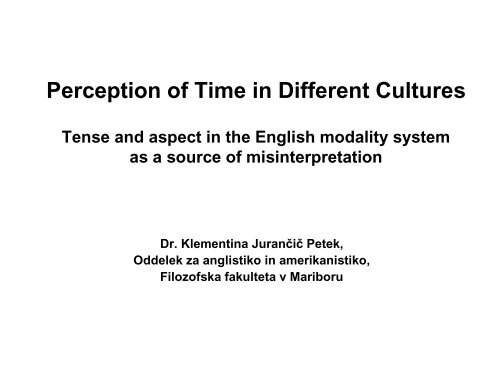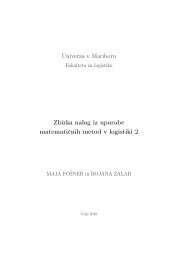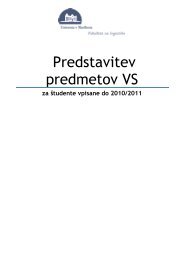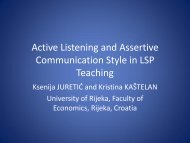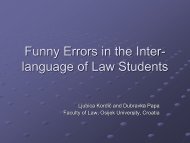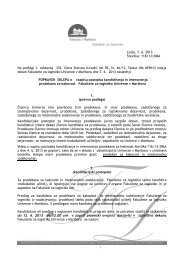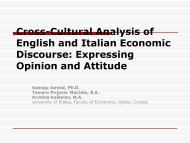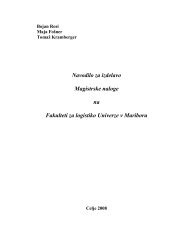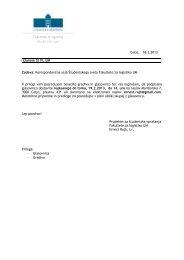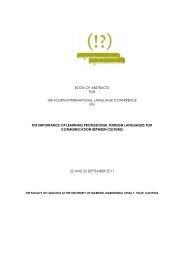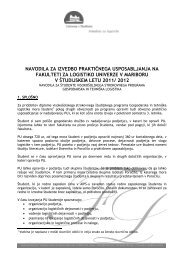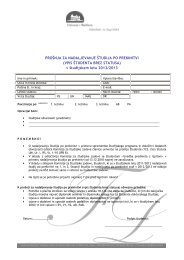Perception of Time in Different Cultures Tense and aspect in the ...
Perception of Time in Different Cultures Tense and aspect in the ...
Perception of Time in Different Cultures Tense and aspect in the ...
You also want an ePaper? Increase the reach of your titles
YUMPU automatically turns print PDFs into web optimized ePapers that Google loves.
<strong>Perception</strong> <strong>of</strong> <strong>Time</strong> <strong>in</strong> <strong>Different</strong> <strong>Cultures</strong><br />
<strong>Tense</strong> <strong>and</strong> <strong>aspect</strong> <strong>in</strong> <strong>the</strong> English modality system<br />
as a source <strong>of</strong> mis<strong>in</strong>terpretation<br />
Dr. Klement<strong>in</strong>a Jurančič Petek,<br />
Oddelek za anglistiko <strong>in</strong> amerikanistiko,<br />
Filoz<strong>of</strong>ska fakulteta v Mariboru
ESP<br />
- not only <strong>the</strong> vocabulary<br />
- but also <strong>the</strong> grammar<br />
Grammar<br />
- technical texts<br />
- social studies texts
Texts on CULTURAL HISTORY<br />
- can be technical texts <strong>in</strong> terms <strong>of</strong><br />
vocabularly frequently <strong>in</strong>volved <strong>in</strong> <strong>and</strong><br />
relat<strong>in</strong>g to e.g. architectural elements<br />
- can be considered social studies texts <strong>in</strong><br />
terms <strong>of</strong> recreat<strong>in</strong>g historical events
In <strong>the</strong> fomer case (technical texts):<br />
- <strong>the</strong> present tense forms (<strong>and</strong> expressions<br />
<strong>of</strong> present time, e.g. <strong>the</strong> present perfect) are<br />
usually used<br />
In <strong>the</strong> latter case (cult.-historical texts):<br />
- <strong>the</strong> past tense <strong>and</strong> <strong>the</strong> past perfect tense<br />
are usually used <strong>in</strong> temporal function <strong>and</strong><br />
modal past perfect <strong>and</strong> past conditionals<br />
for speculations <strong>of</strong> past events
Past conditional<br />
Past conditional or hypo<strong>the</strong>tical past as <strong>in</strong>: e.g.<br />
I would have helped you, but I was busy<br />
or<br />
If you had asked me, I would have helped<br />
you<br />
It consists <strong>of</strong>:<br />
modal verb + have + past participle
Two reasons why hypo<strong>the</strong>tical past causes<br />
problems to <strong>the</strong> Slovene speakers <strong>of</strong> ESL:<br />
1. present perfect form <strong>of</strong> “have + participle”<br />
(Slovene has no one-to-one equivalent for<br />
<strong>the</strong> English (present) perfect tense)<br />
2. non-existence <strong>of</strong> a separate hypo<strong>the</strong>tical<br />
past form <strong>in</strong> Slovene (<strong>the</strong> Slovene pogojnik<br />
is shared with hypo<strong>the</strong>tical present)
<strong>Time</strong> – <strong>Tense</strong> - Aspect<br />
Past English grammar texts considered:<br />
<strong>aspect</strong>: simple (<strong>in</strong>def.) vs. cont<strong>in</strong>uous (progr.)<br />
tense: perfect tenses
Contemporary English grammar texts:<br />
<strong>aspect</strong>: simple (<strong>in</strong>def.) vs. cont<strong>in</strong>uous<br />
(progr.)<br />
<strong>aspect</strong>: perfect tenses
What is <strong>aspect</strong> when it comes to<br />
perfectives?<br />
Aspect <strong>in</strong> perfectives is <strong>the</strong> semantic <strong>and</strong><br />
pragmatic features <strong>the</strong>se tenses express<br />
connect<strong>in</strong>g <strong>the</strong> past time with <strong>the</strong> present<br />
time (e.g. result, consequence,<br />
experience, cont<strong>in</strong>uation, explanation)<br />
render<strong>in</strong>g <strong>the</strong> action to be conceived as<br />
<strong>in</strong>complete, as go<strong>in</strong>g on, <strong>in</strong> progress or<br />
cont<strong>in</strong>u<strong>in</strong>g,…
… which br<strong>in</strong>gs <strong>the</strong>m closer to <strong>aspect</strong> <strong>in</strong> <strong>the</strong><br />
traditional sense, namely “<strong>the</strong> grammatical<br />
category <strong>of</strong> <strong>the</strong> verb which expresses <strong>the</strong><br />
manner <strong>in</strong> which <strong>the</strong> action or state is<br />
presented by <strong>the</strong> speaker…” (<strong>the</strong> simple<br />
(<strong>in</strong>def<strong>in</strong>ite) <strong>and</strong> cont<strong>in</strong>uous (progressive)<br />
forms <strong>of</strong> <strong>the</strong> verb as we know <strong>the</strong>m)
SIMPLE AND CONTINUOUS ASPECT:<br />
Non-native speaker – <strong>in</strong>stance vs. cont<strong>in</strong>uation.<br />
Indef<strong>in</strong>ite: <strong>the</strong> speaker feels <strong>the</strong> action as<br />
unlimited <strong>in</strong> its frequentative, permanent or<br />
durational character<br />
E.g. “Celje lies <strong>in</strong> Slovenia”<br />
Cont<strong>in</strong>uous: <strong>the</strong> speaker feels <strong>the</strong> action as<br />
limited <strong>in</strong> its frequentative, permanent or<br />
durational character.<br />
E.g. “The dog is ly<strong>in</strong>g under <strong>the</strong> car”
Limit<strong>in</strong>g <strong>the</strong> unlimited action would result <strong>in</strong>:<br />
E.g. “Celje is ly<strong>in</strong>g <strong>in</strong> Slovenia”, but<br />
tomorrow it will lie <strong>in</strong> Austria.<br />
Unlimit<strong>in</strong>g a temporaly limited action would<br />
result <strong>in</strong>:<br />
E.g. “The dog lies under <strong>the</strong> car.”<br />
It is obviously dead.<br />
Slovene learners usually associate <strong>aspect</strong><br />
only with actions be<strong>in</strong>g or not be<strong>in</strong>g <strong>in</strong><br />
progress at a certa<strong>in</strong> po<strong>in</strong>t <strong>of</strong> time.
PRESENT PERFECT ASPECT:<br />
PRES. PERF. “I have opened <strong>the</strong> w<strong>in</strong>dow” –<br />
RESULT = <strong>the</strong> w<strong>in</strong>dow is open<br />
PAST T. “I opened <strong>the</strong> w<strong>in</strong>dow (yesterday)”.<br />
= <strong>the</strong> open<strong>in</strong>g <strong>of</strong> <strong>the</strong> w<strong>in</strong>dow took place at a<br />
certa<strong>in</strong> time <strong>in</strong> <strong>the</strong> past<br />
Both sentences are translated <strong>in</strong>to Slovene as:<br />
“Odprl sem okno”
The Present perfect <strong>and</strong> Slovenes<br />
Perfect tenses – non-existent <strong>in</strong> Slovene<br />
Slovene learners <strong>of</strong> English<br />
- associate <strong>the</strong>m with tense <strong>and</strong> time ra<strong>the</strong>r<br />
than <strong>aspect</strong><br />
- present perfect tense asociated with present<br />
time<br />
- as a result – <strong>the</strong> present perfect form <strong>in</strong> <strong>the</strong><br />
past conditional is associated with <strong>the</strong> present<br />
time
Hypo<strong>the</strong>tical past<br />
e.g. If you had asked me, I would have<br />
helped you (hypo<strong>the</strong>tical past)<br />
e.g. If you asked me, I would help you.<br />
(hypo<strong>the</strong>tical present)<br />
Both are translated <strong>in</strong>to Slovene with <strong>the</strong><br />
“pogojnik”<br />
e.g. Če bi me prosil, bi ti pomagal.
The past tense forms <strong>of</strong> <strong>the</strong> hypo<strong>the</strong>tical<br />
present<br />
e.g. If you asked me, I would help you.<br />
encourages Slovene learners to apply this<br />
form to present/future <strong>and</strong> past time alike.<br />
Association <strong>of</strong> present perfect to present time<br />
can result <strong>in</strong> hypercorrection <strong>of</strong> <strong>the</strong> type:<br />
e.g. If you had asked me, I would had helped<br />
you.
Can phenomena such as perfect tenses <strong>and</strong><br />
hypo<strong>the</strong>tical past be learnt by Slovene<br />
ESL learners by means <strong>of</strong> acquisition<br />
without <strong>in</strong>struction?<br />
Perfect tenses – possibly, not entirely to <strong>the</strong><br />
targeted effect, but merely on <strong>the</strong> basis <strong>of</strong><br />
contextual clues (good students do it)<br />
Hypo<strong>the</strong>tical past – NO, not without<br />
<strong>in</strong>struction (even good students fail)
Thank you!


